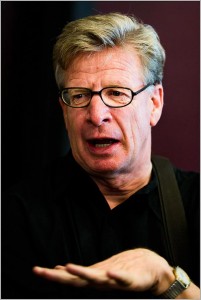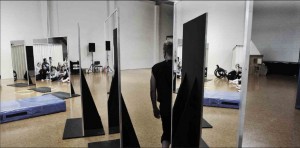Editorial
Welcome to the twelfth edition of NUTS NZ – the Newsletter for University Theatre Studies New Zealand. The purpose of the newsletter is to help us communicate more effectively as a community of scholars interested in Theatre and Performance. We have an interesting selection of stories and items for you in our final issue for 2016. First up, we would like to remind you that this year’s National Examiners and NZ Universities Committee for Theatre/Performance Research meetings will be hosted by Otago University on Tuesday 15th November. There are also some important events coming up that you should note in your calendar. This includes the Auckland University’s symposium Accessible Arts: Practice and Barriers which is happening today – but is an important event we thought we should bring to your attention. Don’t forget that the University of Otago is hosting the interdisciplinary conference entitled ‘Performing precarity: Refugee representation, determination, and discourses’ from 21-23 November 2016. Should be an interesting event. Also, we’ve included some information on the ADSA conference next year which is entitled ‘Performing Belonging in the 21st Century’. The deadline for the ADSA conference is looming – abstracts are due in on Monday the 20th of November! There is also the Social Alternatives’ call for papers on ‘Issues on Performing, Community, and Intervention’. We also have information on Victoria University’s latest play – The Trojan Women – and a link to the review. In our last “NUTS People” segment for the year, we are profiling Victor Rodger and Stuart Hoar. We are not sure if we will be back again next year, but if we are, we will be looking for your support and contributions to make this newsletter work.
Kind regards,
NUTS NZ editors: Jane Marshall and Rand Hazou.
NUTS People
In each edition of NUTS NZ we profile an academic and a postgraduate student to show case “our people” and their current research/interests. In this issue we have Hilary Halba and Kiri Bell from The University of Otago. As always, NUTS NZ asked each of them to answer the following questions:
- What is your research about?
- What theatre/performances have you seen recently?
- What have you been reading lately?
Victor Rodger
This year my theatre entity, FCC, produced two plays: Puzzy by Hawaiian-Filipina writer Kiki – with additional material by myself – and Wild Dogs Under My Skirt by my cousin, Tusiata Avia. As this year’s Robert Burns Fellow at the University of Otago, I’ve worked on a few projects: Black Ice (a family drama), White Noise (an academic comedy), and I also worked on a cabaret called Christ(church) Almighty which will – hopefully – get on its feet in Christchurch next year.
I have recently read Girl on The Train and – most recently – Gone Girl. This is because I’ve been dabbling with the thriller form myself. Currently, I’m reading Eileen by Ottessa Moshfegh which was shortlisted for the Booker this year. After that, I’m going to read The Mandibles by Lionel Shriver whose controversial speech at the Brisbane Writers Festival certainly made me roll my eyes.
The most recent performance I saw was a show devised by two NASDA honours students, Asovale Luma and Shea Kouka, in Christchurch called Mai Slam. They used six local kids from Aranui and the show was a mixture of spoken word, song and skits. It was a work in progress and was certainly a bit rough around the edges but I came out of that show feeling like I’d had more fun watching that than just about anything else I’d seen this year. I also recently caught Not in Our Neighbourhood by Jamie McCallister. He’s my pick of the current writers in NZ for his ability to be able to write relevant, hard-hitting drama as well as well-crafted low-brow comedy.
Stuart Hoar
I’m currently rewriting a play about a drone pilot who meets a NZ woman. They have an affair but he neglects to tell her precisely what his job is. This play was written a year or two ago and has had a reading by ATC. I’m also trying to finish a novel I’ve been writing for a long time, only a few thousand words to go. I’m also researching for a new play I hope to start work on soon; this is a play about Michael Joseph Savage and Ned Kelly.
Books I have lately read are The Writers’ Festival by Stephanie Johnson, The Spy Who Came in from the Cold by John Le Carré, Attila the Hun by John Mann and a new play This I Know to be True by Andrew Bovell.
Plays I’ve been to recently include Billy Elliot, Call of the Sparrow, Retro Williams, The Protest, The Pink Hammer, Lucrece, Zen Dog Sartori, Shot Bro and A Ghost Tale.
Symposiums
Accessible Arts: Practice and Barriers
Friday 11th November 2016, 1.30-3.30pm
M2 Drama Studio, Faculty of Education and Social Work, University of Auckland, 74 Epsom Avenue
A half-day symposium for practitioners, researchers, students and disabled people who share an interest in disability arts and accessible arts practices. Presentations and discussions will focus on how participants might better achieve inclusive outcomes in schools, community settings and higher education.
Discussants:
Emma Bennison (via Skype) – CEO Arts Access Australia
Stuart Shepherd – Curator and Lecturer at Bay of Plenty Polytech, and Tutor at Mapura Studio
Margaret Feeney – Studio Coordinator and Arts Tutor, Mapura Arts Studio
Laura Haughey – Senior Lecturer in Theatre Studies, University of Waikato
Sue Cheesman – Senior Lecturer in Dance Education, University of Waikato, and tutor for Touch Compass
Chairs:
Rod Wills and Molly Mullen, School of Critical Studies in Education/Critical Research Unit in Applied Theatre
This event is free and includes afternoon tea.
Places are limited so please register via https://www.eventbrite.com/e/accessible-arts-practice-and-barriers-tickets-28926871050
For more information contact: m.mullen@auckland.ac.nz
Conferences
Performing precarity: Refugee representation, determination, and discourses
21-23 November 2016
The University of Otago, Dunedin,
Keynotes:
Professor Suvendrini Perera (Curtin University, Perth, Australia) & Professor Nikos Papastergiadis (University of Melbourne, Australia)
The current European refugee crisis continues to be a major focus of media attention as well as a point of political, cultural, ethical and social conflict. Images of migrants are constructed, mediated and circulated to create compelling representations of refugee-hood that serve a variety of agendas and conform to specific identities and expectations. They are, in this sense, performances. In addition, refugees in Europe and other regions, including Australasia, are subjected to detention and/or expected to perform/conform in certain ways to meet the shifting demands of determination processes and the cultural preferences of different regions. Once released from detention and/or recognised as refugees, another set of performances ensues – ‘welcome’ from the host country and ‘gratitude’ from the refugee. This interdisciplinary conference aims to draw together scholars from a wide variety of fields to examine the ethics and politics surrounding refugee representation, determination, and discourses.
ADSA: Performing Belonging in the 21st Century
27 – 30 June 2017
Auckland University of Technology, Auckland University, Massey University
KEY DATES: Monday 20 November 2016 – Abstracts Due and Monday 11 December 2016 – Notification of Acceptance
The Māori concept of tūrangawaewae suggests a place to stand, a homeland, a way of belonging. Belonging, like identity, is a matter of ongoing performance: on stages and in the streets, in community halls, clubs, sporting arenas, churches and parliaments. In ‘Belonging and the politics of belonging’ (Patterns of Prejudice 2006), Nira Yuval-Davis observes that ‘Belonging is about emotional attachment, about feeling “at home”’ (197), and later notes:
The politics of belonging includes also struggles around the determination of what is involved in belonging, in being a member of a community, and of what roles specific social locations and specific narratives of identity play in this. (205)
Belonging may be deeply felt, but it is also manifestly constructed and capitalised upon, a matter of collectivity and communality, of inclusion and also of exclusion. We make ourselves into an ‘us’ by marking others as ‘them’, say we are of this place and they are not. Belonging is thus also a matter of desire, as much of longing to be as it is of being per se. Echoing Zygmunt Bauman and Leonidas Donskis, who want to ‘rediscover the sense of belonging as a viable alternative to fragmentation, atomization, and the resulting loss of sensitivity’ (Moral Blindness 2013: 12), we invite participants to think out loud about the diverse ways that belonging can be seen to be performed, onstage and off in the 21st century.
Topics might include:
- Ritual, theatrical and everyday performances of belonging
- Indigenous performances of belonging
- Pasifika and Oceanic performances of belonging
- Postcolonial performances of belonging, and of longing to belong
- The construction and performance of belonging in the context of diaspora
- The performance of privilege as it sits next to the performance of belonging – especially in the postcolonial state
- The many ways belonging and its obverse, otherness, can be performed in relation to communities, to those who align as ethnic, or LGBTI, who are of varied abilities, or who identify as seniors or youth
- The tension between practitioners who ‘belong’ – in particular, Indigenous artists – and scholars who might not
- Belonging, place and site-specific performance
- Intermedial belonging
- The performance of belonging through social media
- Protest, performance interventions, and (de)constructions of belonging
- Performing citizenship, participation and belonging
- Asylum and refugee theatre, non-citizenship in performance and the staging of dis-placement
- Pedagogical performances of belonging
- Actor training, belonging to character and role, and inhabiting the performance space
Maximum 250 words.
Email abstracts to: belonging@aut.ac.nz
Join us on Facebook: https://www.facebook.com/search/top/?q=performing%20belonging%20adsa%202017
CONTACT
Dr Sharon Mazer
Associate Professor of Theatre & Performance Studies
Auckland University of Technology
CFPs
CALL FOR PAPERS: Social Alternatives: Issue on Performance, Community and Intervention
The concept of ‘intervention’ usually signals the arrival of an outsider or a group of outsiders seeking to enable some kind of change within an individual or a particular community. Alternatively, intervention can be understood as an interruption: an intercession, an attempt to disrupt the status quo and cause change. In theatre and performance for, with, or by communities, intervention can evoke the image of the well-meaning ‘expert’, someone who applies the processes of drama to help heal fractured communities, give voice to the voiceless, or empower participants to acknowledge their own oppression. While the act of intervention is often accompanied by good intentions, it raises numerous questions on an ethical front, in particular issues of power and the right to speak on someone else’s behalf. How can the concept of intervention in performance be theorised, problematized and alternatively articulated? How does intervention manifest in theatre for, with and by communities? How does an interruption in the status quo of a community impact that community?
Social Alternatives is seeking to extend the discussion on performance and intervention and welcomes a range of submissions exploring this theme. Opportunities to contribute involve: academic articles, short stories, poetry, scripts and commentaries. It is anticipated that responses to this theme will be wide, and may take the following points into consideration:
- Re-envisioning intervention as ‘joyful encounters’
- Verbatim theatre as intervention
- Performance and interventions in gender representation
- Intervening in the public space through performance
- Theorising strategies and acts of intervention in performance
- Community theatre intervention
- Prioritising process or product in performance intervention
- Theatre, therapy and social conflict
- Intervention as interruption
- The impact of intervention in/through performance
Abstract Due: 1st December 2016. Guidelines for Contributors can be found at: http://socialalternatives.com/contributions
Social Alternatives is an independent, quarterly refereed journal. It is committed to the principles of social justice, commenting on important social issues of current concern or public debate. We publish practical and theoretical articles on relevant topics, as well as reviews, short stories, poems, graphics, comment, and critique.
Direct enquiries and submissions for this issue to the guest editors:
Dr Natalie Lazaroo, School of Education and Professional Studies, Griffith University natalie.lazaroo@griffithuni.edu.au
Dr Sarah Peters, School of Arts and Communication, University of Southern QLD sarah.peters@usq.edu.au
Performances
Victoria University recently performed a new translation of The Trojan Women. See the performance details and link to a review by John Smythe below.
THE TROJAN WOMEN
By Euripides’
A New Translation by Simon Perris
Directed by Bronwyn Tweddle
Presented by THEA301 at Studio 77 Amphitheatre, 77 Fairlie Tce, Wellington
From 5 Oct 2016 to 9 Oct 2016
http://www.theatreview.org.nz/reviews/review.php?id=9640
New Degree Offerings
Victoria University are launching a new MFA degree in 2017 — scholarships are available! See the link below for further details.
http://www.victoria.ac.nz/news/2016/09/new-postgraduate-arts-degree-hones-creative-skills-for-job-market




